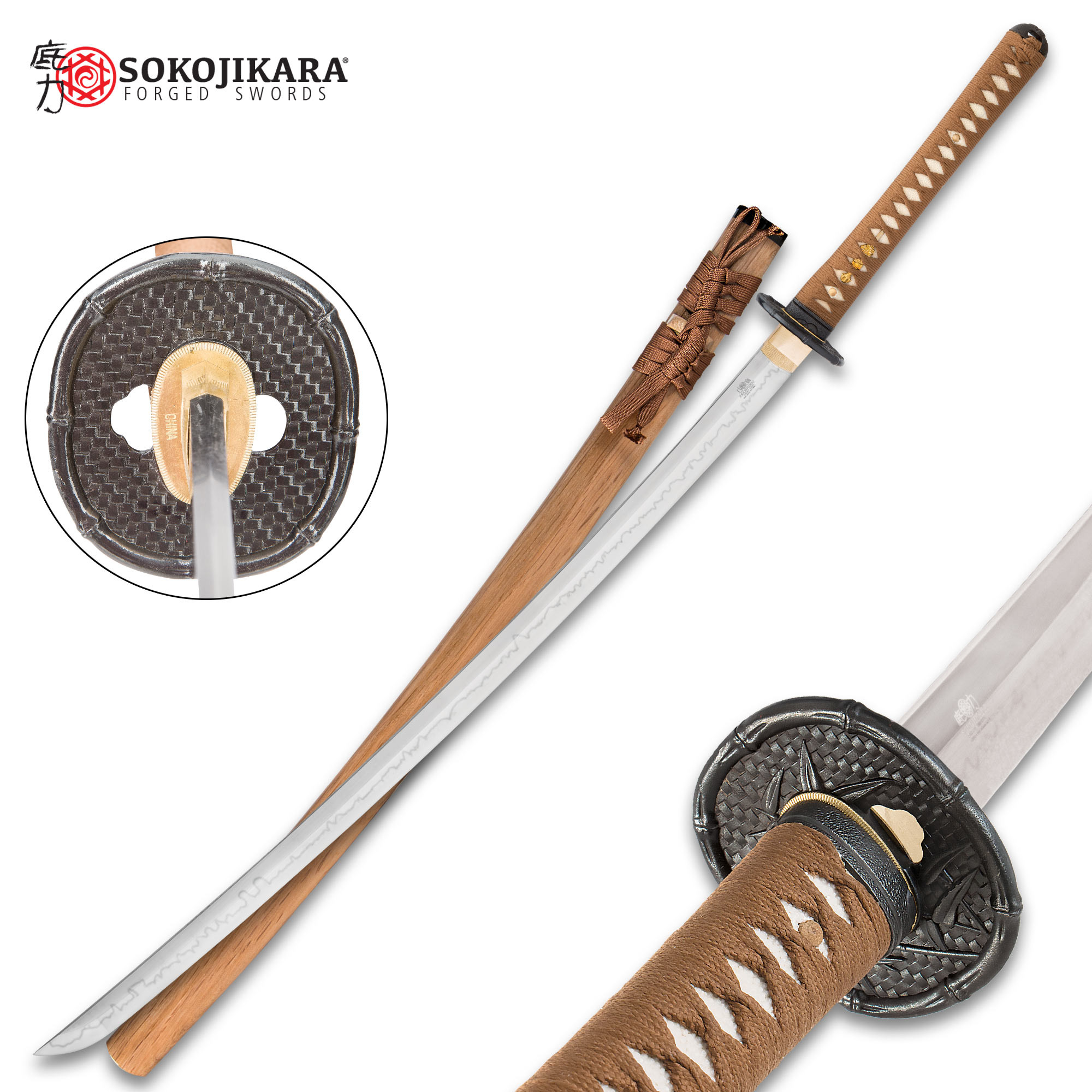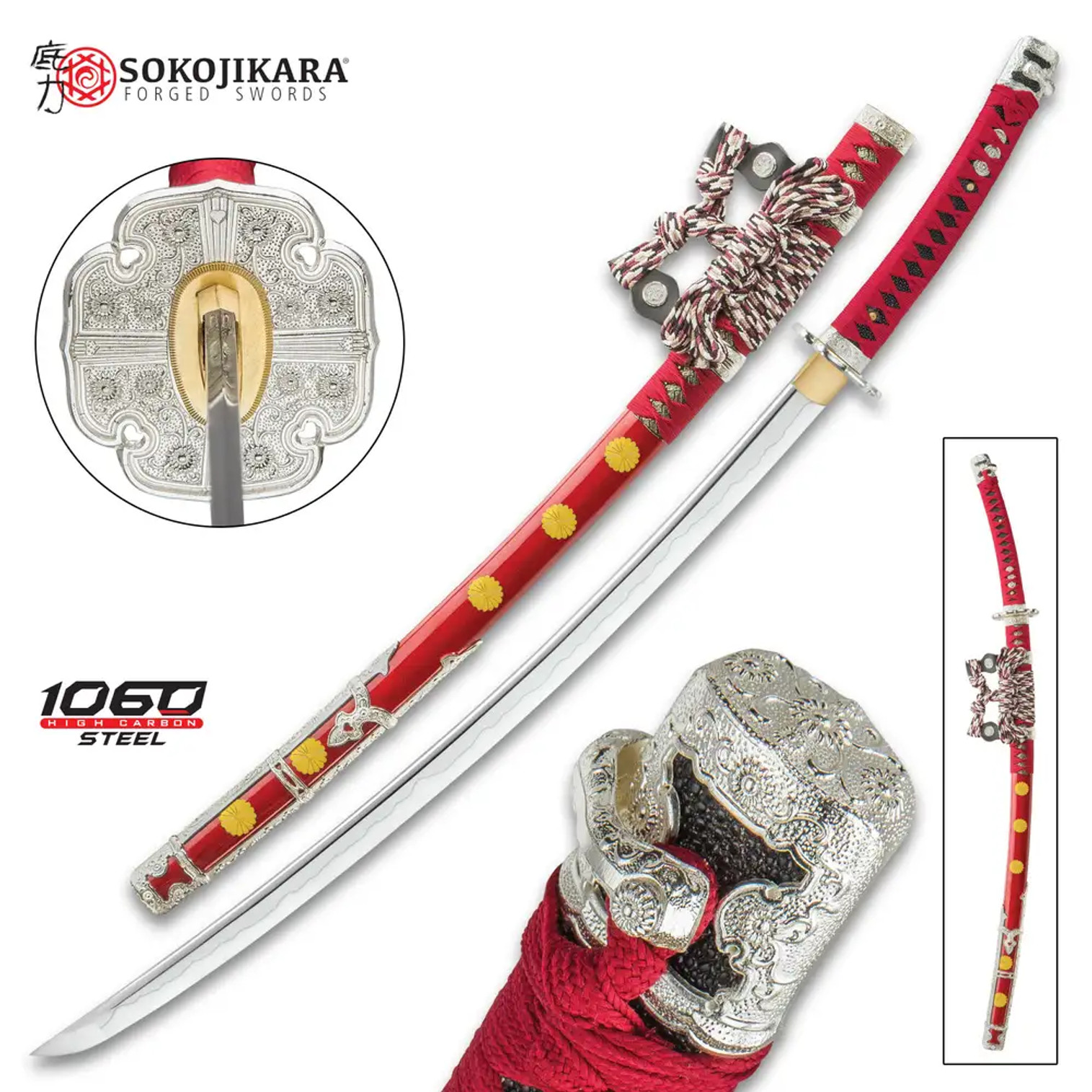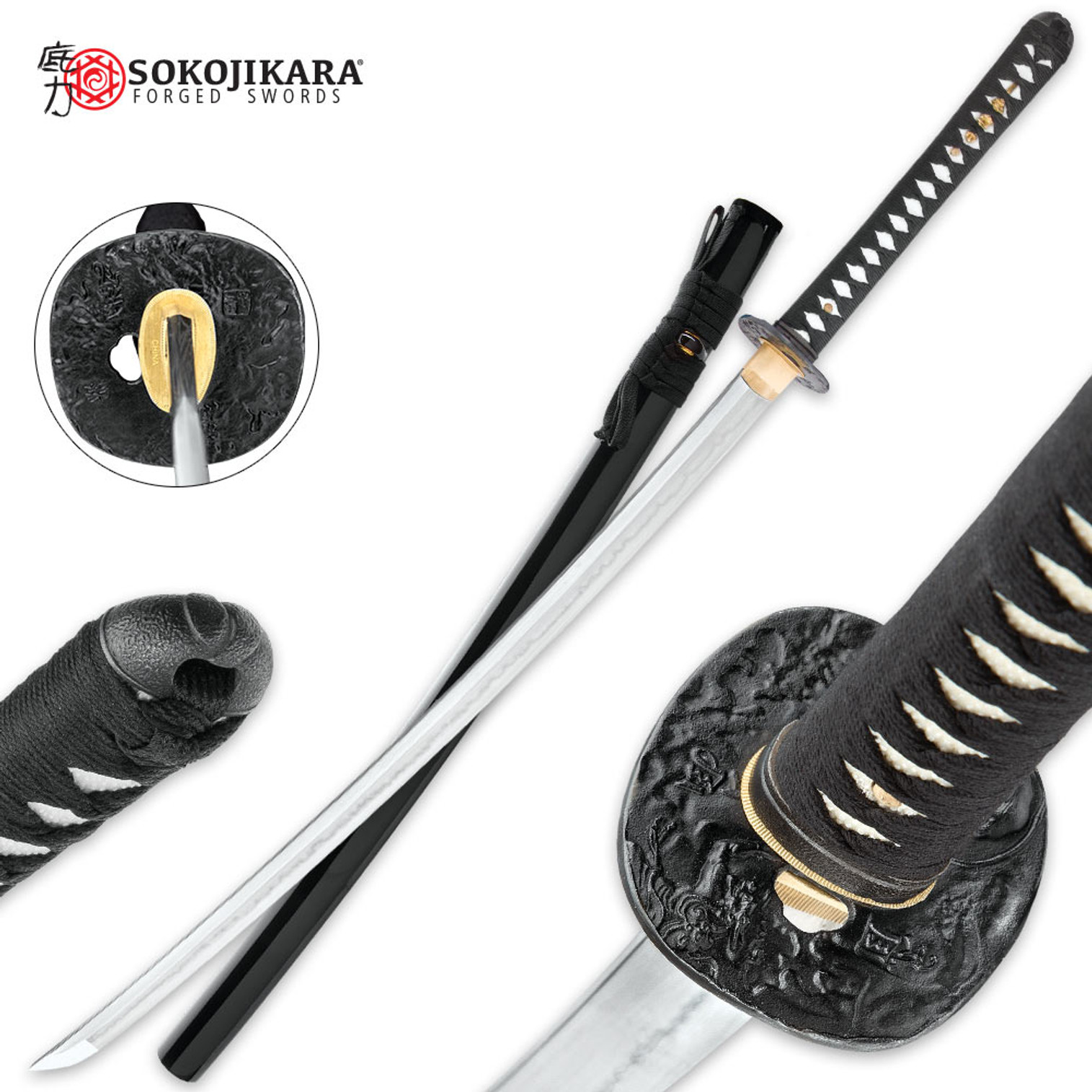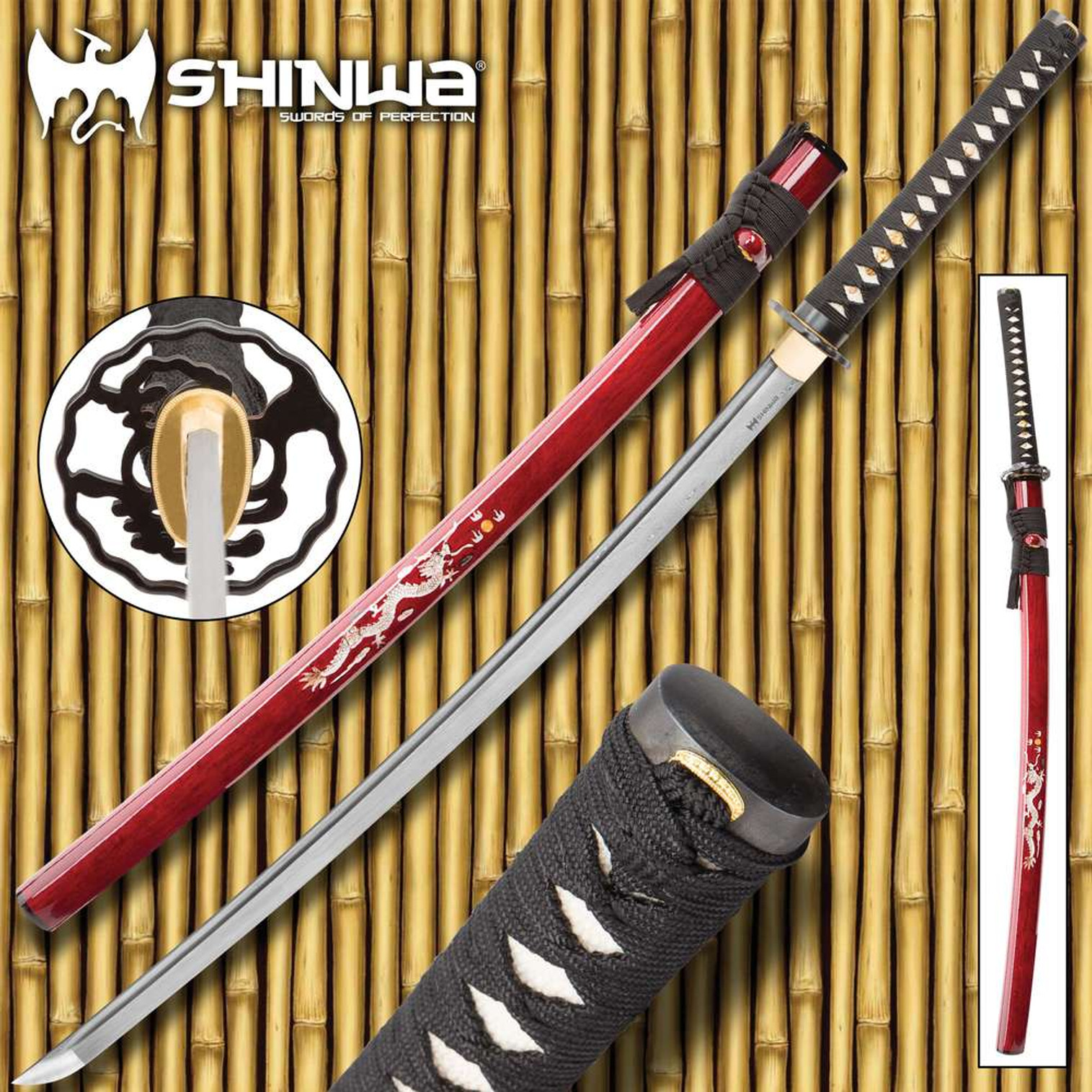One incredible sword-wielding experience after another
Sokojikara's raw, earthy "Bambusa" Katana is inspired by the noble bamboo plant. “Bamboo?” you ask. “What does a mundane, weed - little more than panda fodder - have in common with a rare, custom-quality handcrafted sword like the Bambusa?” The answer: unmatched strength, incredible affordability and value, ideal weight and near-endless versatility, to name a few. There’s more to the common bamboo plant than meets the eye. Among both natural and manmade materials, bamboo is one of the strongest on earth, as proven in countless scientific trials. This unassuming “weed” withstands compression better than concrete and boasts greater tensile strength than steel, all at a fraction of the weight and cost. Similarly, theres’s more to the Bambusa Katana than meets the eye, though - unlike its namesake plant, the bamboo - this traditional Japanese samurai sword is beautiful, eye-catching and no doubt impressive from the very first glance. Many of Bambusa’s greatest treasures lie beneath its striking visual facade, and some - like clay tempering - are even altogether intangible. Just as engineers continue to unearth new uses for bamboo, there are always new treasures to discover in the Bambusa Katana. This distinctive traditional Japanese samurai sword is an infinite swordcraft goldmine, never ceasing to yield rich sword-wielding experiences from the moment you first grasp the tsuka.
Made of blood, sweat, tears, and premium T10 steel
Sokojikara developed the Bambusa with the serious swordsman in mind. Master smiths painstakingly hand forge every Bambusa blade, and seasoned sword artisans carefully handcraft each tsuka and saya. From vigorously hammering the formless, molten steel to gingerly tapping in the tiny wooden mekugi, every step in the Bambusa's construction receives the utmost care and precise attention to detail. Some of the world's - and history's - most revered, time-tested techniques are employed, and every material is top-of-the-line. A quintessential example is the Bambusa's potent T10 tanto blade. One of the most sought-after high carbon steels in modern swordcraft, T10 alone would yield a blade with a nasty bite. But the Bambusa takes it a step further, enhancing the blade with a time honored differential hardening technique called “clay tempering.” Unique to traditional Japanese swordcraft, clay tempering was developed centuries ago by Edo-period smiths and is integral to the katana's longstanding, well-earned reputation as the sharpest sword on earth. A T10 blade may have a “nasty bite,” but a clay tempered T10 blade like the Bambusa’s is nothing short of devastating. And the “devastation” persists, battle after battle, cut after cut…
Sharpest in the world and stays that way, thanks to clay tempering
Clay tempering imparts edge retention that's simply without equal. Like a koi gliding through a still pond, the Bambusa's blade slices through rolled bamboo tatami mats and even cinder blocks cleanly and effortlessly, suffering neither crack nor fissure and all-the-while retaining its razor sharp edge. The Bambusa is able to withstand such punishing cutting trials thanks, largely, to clay tempering. Prior to the intense heat of the hardening phase, Sokojikara's seasoned swordsmiths coat the newly formed, unrefined blade with clay - a thin layer along the edge, a thicker layer on the body and spine. When the blade emerges from the hardening forge, the clay layers' contrasting thicknesses cause the steel to cool at slightly different rates, yielding two distinct hardness regions. The less-insulated edge cools faster, making it harder for superior edge retention and shear strength. The thicker, more insulating coat of clay causes the body/spine to cool more slowly, rendering it "tougher"- less brittle, more flexible and better equipped to absorb impact energy. Though conceptually simple, clay tempering requires skilled hands and years of experience. It’s a slow, labor-intensive process that has changed little since its 15th century origins. But when you see the Bambusa in action, you’ll undoubtedly agree it’s well worth the time and effort.
Sublime feel, practically Zen-like wielding experience
The Bambusa's weight is shrewdly distributed to maximize swinging momentum and power, blow after devastating blow. This impeccable balance also improves control and responsiveness, allowing for greater agility and flexibility in combat. The delicately textured genuine ray skin same and soft braided ito that cloak the tsuka afford a comfortable, no-slip grip, further enhancing the Bambusa’s superb feel. Flawlessly cast from iron like katana of ages past, the tsuba is embellished with fine reliefs that depict bamboo stalks on a delicate woven rattan background. A classic brass menuki is nestled between ito and ray skin same, offset by traditional mekugi that are - fittingly - made of bamboo.
Experience the Bambusa, then pass it on
The Bambusa has proven itself time and again, and it holds its own against any of today's most expensive katana, outperforming many. But the old cliché is true - "action" does indeed "speak louder than words," and at this unbeatable, downright unheard of price, why deny yourself the opportunity to experience Sokojikara's Bambusa Katana for yourself? No matter how you use it, with proper care you can enjoy it for a lifetime, then pass it down to your children, grandchildren or great-grandchildren! The Bambusa is heirloom-quality and built to be treasured by generations of your descendants - your legacy preserved in hand forged steel.
- Inspired by one of the world’s strongest materials, bamboo; handcrafted using some of the world’s finest, most sought after materials, including T10 and ray skin; beautiful, eye-catching with natural,
- Full tang 28" T10 high carbon steel blade - expertly hand forged by seasoned swordsmiths using advanced techniques honed over centuries
- Centuries-old clay tempering process yields tough, impact-absorbing blade spine/body and history's sharpest edge; also produces natural hamon line
- Classic tsuka wrapped in delicately textured genuine ray skin same and braided ito; traditional wooden mekugi, brass menuki
- Elegant, exquisitely detailed tsuba flawlessly cast from iron like katana of ages past; accented with delicate relief designs
- Natural wooden saya embellished with traditional sageo
- Overall length: 41" - the ultimate Japanese samurai sword; unstoppable in battle yet not too large to impede movement
 Sales@herooutdoors.com
Sales@herooutdoors.com
 CDN
CDN











